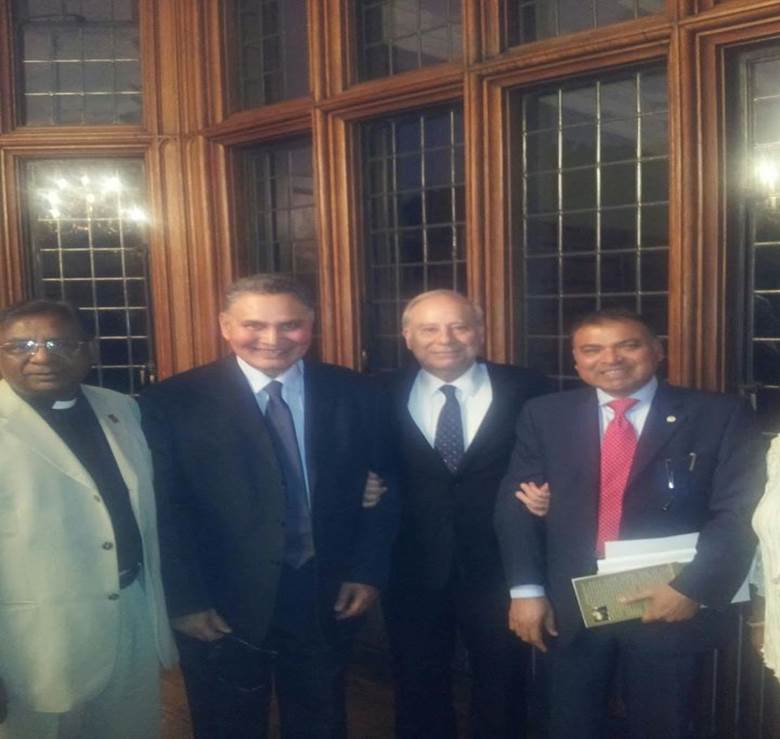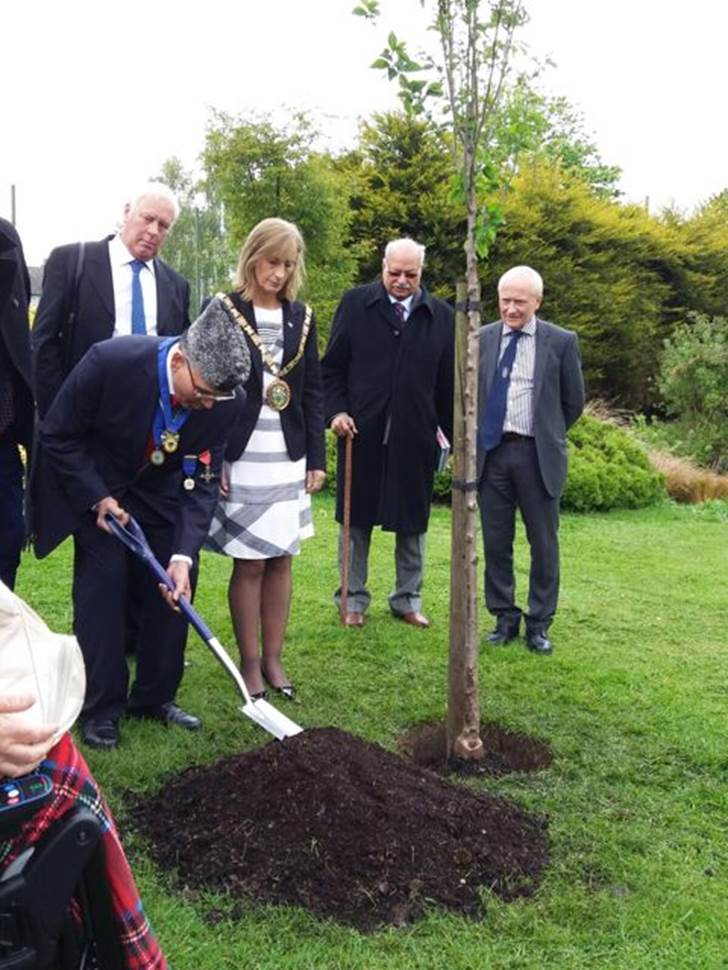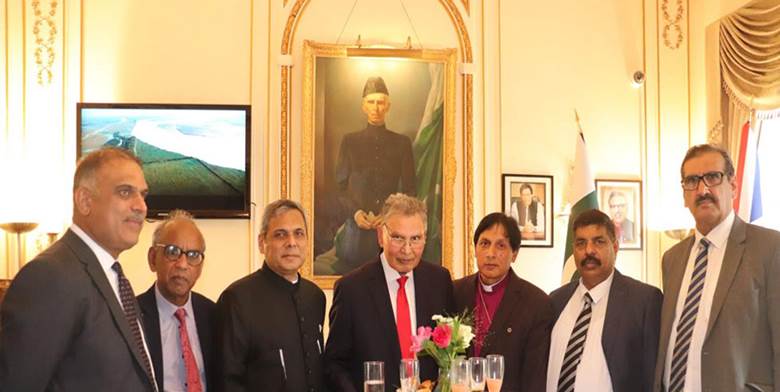
Dr Akbar Ahmed (second from right) is seen with a delegation of Pakistani Christians, including Dr Shera (second from left), on a historic visit to Lambeth Palace. Ahmed was the first ever Pakistani High Commissioner to the UK to call upon the Archbishop of Canterbury at Lambeth Palace
A Friendship across Faiths Provides Hope for a Fractured World
By Scarlett Stevens
Washington, DC

(This article was written to honor Dr James “Jim” Shera who passed away in Gujranwala on Monday, January 15, 2024.)
Just a few years ago, Pew Research Center found that fifty-five percent of Protestant Christians in the US surveyed believed that Islam and democracy are naturally incompatible. The media often perpetuates this alleged incompatibility, and yet, great connections can exist between those who may at first seem different. Many American Christians lack valuable relationships with those of other faiths and fail to see that Muslims have so many of the same hopes and fears, values and passions.
One of the most hopeful models of an interfaith relationship that I came across is that of Dr James “Jim” Shera, who appeared on “Gateway Gazette with John Bosco” alongside his esteemed colleague and dear friend, Ambassador Akbar Ahmed on June 25th. Few Americans know who Dr Shera is, but so many should look to him as a remarkable scholar and Christian who promotes religious tolerance. He previously served as the first Pakistani Mayor of Rugby in the UK, the birthplace of the sport by the same name. As well as being awarded the Sitara-e-Pakistan, he was also honored by the Queen of England, and was reelected as a Ben Ward councilor ten consecutive times. The morning following his appearance on “Gateway Gazette”, I had a wonderful conversation with Dr Shera, during which he reflected fondly on his lengthy career engaging in interfaith dialogue, as well as his treasured friendship with Ambassador Ahmed, which spans four decades. The collaboration between these exemplary minds has given birth to a number of vital contributions in the fields of interfaith dialogue and religious tolerance.

Wearing a Pakistani Jinnah cap Dr Shera plants a friendship tree in the borough of Rugby at a 2017 ceremony conferring him with the honor "Freedom of the Borough of Rugby" for his dedication to the borough and building bridges. A delegation, including former Pakistani High Commissioner Wajid Shamsul Hasan, looks on
One of the greatest achievements of Ambassador Ahmed’s career was his making of the 1998 film, Jinnah, starring Christopher Lee. Behind the scenes, Dr Shera traveled alongside Ambassador Ahmed and answered tough questions with wit and sincerity, employing his Punjabi sense of humor on the road. He met the President of Pakistan and other key officials as he lobbied on behalf of his friend’s film project. In the years following the film’s release, there has been controversy concerning the disproportionate amount of credit that has been given to the director. In defense of Ambassador Ahmed, Dr Shera recently wrote a letter to the editor of The Express Tribune entitled “Akbar Ahmed’s Jinnah”. In this letter, he called attention to this controversy and said, “I think screening the film without Dr Ahmed’s name is a very distasteful way of ignoring the contribution, commitment and hard work of someone who was the architect of the film and who helped on an international scale to make it possible.”
But their collaboration did not stop there. On behalf of Ambassador Ahmed, Dr Shera had the incredible opportunity to share his wealth of knowledge at the highly regarded Oxford Union Debate Society when the Ambassador was not able to avail of the invitation but requested that Dr Shera represent him. Ambassador Ahmed sought a spokesperson who would represent Islam “with sympathy and knowledge” in the 1990s, and from his perspective as a Christian Dr Shera argued the compatibility of Islam and democracy. Ambassador Ahmed also chose Dr Shera in his place to speak at a United Nations sponsored conference in Istanbul, Turkey, which he considers one of the most daunting speaking engagements of his career. Dr Shera recalled that he was very nervous to speak, particularly since the UN does so much important interfaith work on a global scale, but that he was reassured by his friend after several long sessions.
Impressed with his speaking and organizational abilities, Ambassador Ahmed once more recruited Dr Shera this time to head The Pakistan Society, an organization founded in 1951 to strengthen the bond between the United Kingdom and Pakistan. Not only did Dr Shera set out to make Rugby a more tolerant place as Mayor, but he has also worked with Dr Ahmed to promote a Pakistan faithful to the ideas of the founder, Mohammad Ali Jinnah.

Rt Revd Dr Bishop Nadeem Bhinder standing with Hon Cllr Dr James Shera MBE (Former Mayor Rugby, Sitar-e-Pakistan), Hon Nafees Zakaria (Former High Commissioner to the UK for Pakistan), Hon Saleem Khurshid Khokhar (Former MPA Sindh), Hon Cllr Tariq Dar MBE, and Hon Makhdum Ali Chishty (Former Commander North London Police)
In honor of their work as activists for larger humanity, Dr Shera and Ambassador Ahmed were invited to Lambeth Palace by Dr Rowan Williams, Archbishop of Canterbury, for what would be one of his final interfaith gatherings. At this event, Dr Shera said of his friend: “As a South Asian Christian I can say with pride South Asia has produced two Akbars—Akbar the Great, the emperor who united India, and Akbar Ahmed, who brings peace and harmony among the nations through research and knowledge. Akbar who I have known for decades is my brother and hero. He belongs to all of humanity.”
Ambassador Ahmed has also ensured that his pursuit of peace, and the pursuits of individuals like Dr Shera will continue in further generations. Ambassador Ahmed’s daughter, Dr Amineh Hoti, has also developed a strong bond with Dr Shera over the years. “She is taking the torch from her father,” Dr Shera said of Hoti’s career as an international scholar of Islam and interfaith peace. Although Dr Hoti is a strong Muslim, she considers Dr Shera to be a “spiritual father,” and a close family friend. Her continuation of interfaith work in the UK and the Muslim world honors the legacies of these great men, and has set the precedent for a greater number of women to act as ambassadors of religious pluralism. Her most recent contribution is a book project, “Gems and Jewels: The Religions of Pakistan”, which explores the country’s minority faiths, in which Dr Shera is frequently cited.
The friendship between Dr Shera and Ambassador Ahmed was further solidified when Ahmed served as the Pakistani High Commissioner to the UK. Looking back on their regular lunches in Ambassador Ahmed’s office, many would have expected dining with the Commissioner to be a lavish affair, but instead, things were often more casual. “No briyani,” Ahmed said, humorously recalling their lack of lavish meals, “just plain sandwiches.” In his reflections, Dr Shera could not have said kinder things about his dear friend the Ambassador. “Akbar is a man for all humanity,” he remarked. Dr Shera emphasized that Ambassador Ahmed is worthy of the many awards he has received, and even suggested that he would be an appropriate recipient of the Nobel Peace Prize for his devotion and dedication to interfaith ‘mingling’. On hearing of this Ambassador modestly insisted it is Dr Shera who should be nominated. Some critics of the friendship between these two men have semi-jokingly said that “Dr Shera has made Dr Ahmed into a Christian and Dr Ahmed has made Dr Shera into a Muslim.” But rather than change each other’s religions, the pair has instead expanded each other’s minds while still adhering to their own faiths.
The “interfaith brotherhood”, between Ambassador Ahmed and Dr Shera demonstrates that sometimes the greatest relationships are with people who challenge our beliefs and ideas. After four decades of friendship, the two still regularly talk, with Ambassador Ahmed in Washington, DC and Dr Shera in Rugby, UK. The issues that have concerned them, intolerance, inequality, poverty and injustice still agitate them. Amid racial tensions, political polarization, and the collective threat of COVID-19, everyone must look beyond their own beliefs and collaborate with people from all across the world. Dr Shera remarked that the Coronavirus does not discriminate based on a person’s religion, and because of this we must be a united front, using this pandemic as an opportunity to bring people and nations together instead of ripping them further apart. “He is Saint James,” says Ambassador Ahmed thoughtfully,
My hometown lies less than two hours away from Charlottesville, VA, the site of one of the worst outbreaks of violent racial conflict in this country. As a young woman in America, I know how challenging it can be to see the light at the end of the tunnel, and to find patriotism in a place that seems plagued with hate. However, heartwarming alliances, such as the one between Ambassador Ahmed and Dr Shera, harbor both solace and invaluable lessons for future generations. Coming from different faiths did not stop these two Pakistani men from finding a friendship and working relationship that enabled them to show the world what peace between Christians and Muslims can look like.
If young scholars in America can approach one another with open hearts and minds, only then will they be able to use this example of ‘mingling’ to ignite a future bright with scholarship, compassion, and religious tolerance.
The lack of sympathy from the executive branch with regards to the Black Lives Matter movement and the effects that COVID-19 has had on communities of color must be countered with overwhelming hope from those who seek to reunify the states. Americans can use this friendship as inspiration for building bridges between Christians and Muslims, white people and BIPOCs. Dr Shera’s final lesson during these complicated times was simple: “We must, now more than ever, learn from each other.”
(Scarlett Stevens is a student at American University’s School of International Service. She is from the Blue Ridge Mountains of Roanoke, Virginia, and is passionate about studying race, religion, and culture.)

